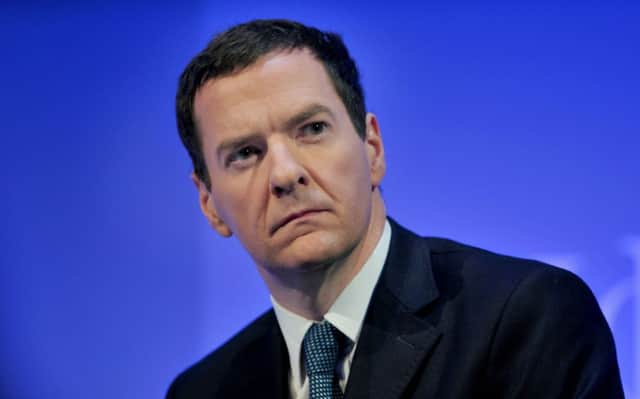Deflation won’t risk economy, Osborne insists


The Chancellor will say the slump in the headline rate to just 0.5% is due to external factors - and the benefits for consumers should be celebrated.
The comments, in a speech to the Royal Economic Society today, come as Mr Osborne and Bank of England governor Mark Carney try to calm nerves.
Advertisement
Hide AdAdvertisement
Hide AdThe Consumer Prices Index (CPI) matched its lowest recorded level in December, driven by sliding food and petrol prices and subdued utility bills.
Economists said that the continued plunge in the oil price meant it was likely to fall further and that brief period of negative inflation was “not entirely out of the question”.
The sharpness of the decline brings the UK uncomfortably close to the scenario in the eurozone where there are fears of a damaging deflationary spiral after inflation fell to minus 0.2%.
But the boost to households should lift the economy by stimulating consumer spending as well as providing a fillip to the coalition Government ahead of the general election in May.
Advertisement
Hide AdAdvertisement
Hide AdMr Carney - who is appearing before the Treasury Select Committee today - will have to pen an explanatory letter to the Chancellor because inflation is more than 1% off the Bank’s 2% target.
The governor has conceded that deflation is now “possible” - but insisted the tools are available to ensure that it does not become a problem.
Mr Osborne is expected to say: “The low inflation we see here in the UK - driven as it is almost entirely by external factors such as the oil price - is much more welcome than in the eurozone where inflation has been very low for some time and is now negative.
“There the debate has understandably turned to the dangers of deflation - the risk of a self-reinforcing spiral where economic activity falters, consumers defer purchases as prices fall and nominal debt burdens become ever harder to manage.”
Advertisement
Hide AdAdvertisement
Hide AdMr Osborne suggested the European Central Bank’s (ECB) inflation target could be changed so it is obliged to take action when inflation is below 2% - as well as above it.
“In the UK our system is well equipped to deal with negative inflation shocks just as it dealt with the surge in commodity prices in 2010 and 2011,” he said.
“A few months of very low or even negative inflation, driven mainly by external factors, does not in and of itself mean that we run the risk of deflation.
“Core inflation, which strips out those factors, remains relatively stable and indeed rose slightly in the data.
Advertisement
Hide AdAdvertisement
Hide Ad“Even more importantly, expectations about future inflation remain well anchored and the latest data show that earnings growth is accelerating not slowing down.
“Of course we will always remain vigilant to ensure that inflation is low for the right reasons.
“But we should not confuse this welcome news for Britain’s households as a result of falling oil prices with the threat of damaging deflation that we see in the eurozone.
“Rising real incomes, a recovery spreading to all parts of our economy, and family budgets that can stretch that little bit further - let’s celebrate these effects of low inflation, not fear them.”